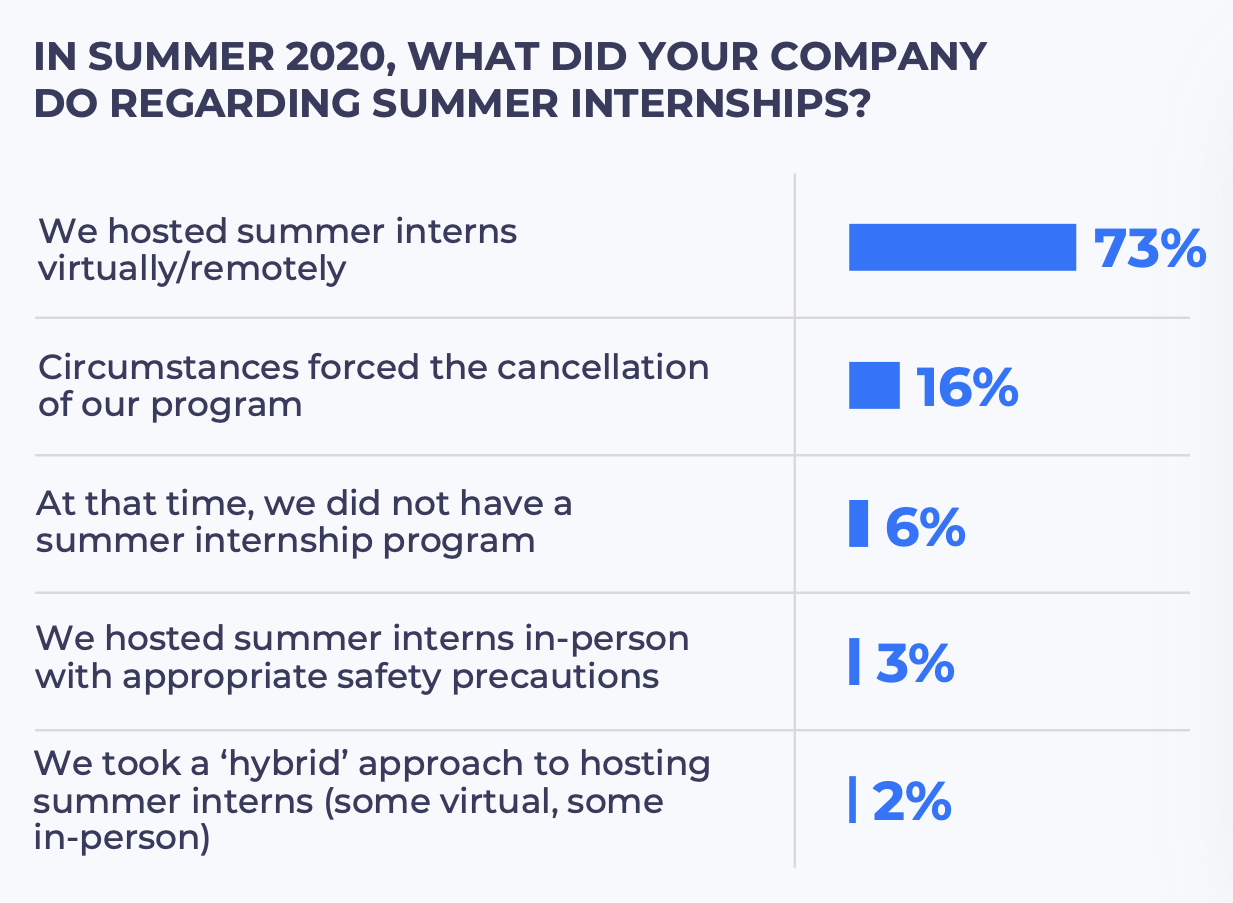When the coronavirus pandemic upended daily life in 2020, the way we work changed almost overnight. Many employees began working from home, originally expecting to return to the office within a few weeks. As it became clear that remote work would continue indefinitely, companies were forced to make decisions about their summer internships. According to NACE, the National Association of Colleges and Employers, more than 1 in 5 companies cancelled their internships entirely in 2020. Of those who held summer internships, 70% conducted them virtually or in an otherwise adapted setting. We found very similar results in a recent survey of campus recruiters.
According to research conducted by RippleMatch for The Gen Z Job Seeker Report, students gave their remote internships an average rating of 4.2 out 5 in 2020, suggesting that they found the virtual internship experience to be rewarding. However, remote internships weren’t without their challenges. Only 44% of interns mentioned community-building with their peers as a positive component of their virtual internships.
Considering the relative success of virtual internships in 2020, but knowing that some companies are starting to return to in-person work, we set out to learn whether companies were planning to host their internships in-person or remotely in the summer of 2021. We surveyed members of the campus recruiting community, representing 95 different companies, to learn what their plans were for summer internships this year. Here are our findings.
In-Person Internships Will be Limited in 2021
According to our survey results, only 7% of companies are planning to host their internships fully onsite in summer 2021. A further 12% had not formally decided on the format of their summer internships as of March 1, 2021. Of those that had not yet decided, most said either that they were waiting for their company to release return-to-office guidelines that corresponded with the internship timeline or that their company was continuing to monitor the COVID-19 case counts to determine if in-person programs could be held safely.
While some companies are still figuring out how to host their internships this summer, those who decided to host theirs onsite were pretty consistent with their reasoning. A full 80% of companies hosting in-person internships are doing so because their intern work cannot be done virtually. Roles in manufacturing or those that require lab work, for example, must be done in-person. Companies also cited the desire to give interns a stronger sense of community and wanting to provide interns with more robust career development opportunities as reasons to host them at their offices.
Hybrid Internship Programs Vary In Implementation
We found that 18% of companies are planning on hosting their internships as a hybrid this summer, but what made these programs ‘hybrid’ varied by organization. For most, a hybrid program means that the internship will be split by business unit. In that situation, some interns will work remotely, while those whose roles can’t be done virtually will meet in-person. For 19% of hybrid programs, the split isn’t by business unit, but by personal choice. For those hybrid programs, interns will choose whether to work remotely or onsite for the summer. A handful of companies are planning to primarily host their internships virtually, but will invite their interns to a central location for meetings or events at least once during the program.
Virtual Internships Will Remain Popular in 2021
Perhaps unsurprisingly, the majority of companies will host their internships virtually once again in 2021. Hosting internships remotely eliminates a lot of uncertainties, like what to do if there’s an uptick in COVID cases that would impact the ability to work in-person. Considering the significant amount of planning that goes into running a successful internship program, it’s understandable that many organizations chose to limit risks.
Deciding to host virtual internships in 2021 also made sense for many companies because they already know they can hold meaningful programs in a remote format. They learned a lot by switching to virtual internships in 2020, and were able to pull off successful programs with little time to plan. With a full year to organize 2021’s virtual internships, they knew they would be able to make the programs even more impactful.
Many of the roadblocks companies faced when planning last-minute are no longer a concern. For example, logistics were a major challenge in 2020, but aren’t as much of an issue this year. 42% of respondents said that working out how to send interns laptops and setting them up with security permissions was a problem in 2020, but only 19% were concerned about that this year. Similarly, 20% cited transferring intern work and projects to a remote setting as a challenge last year, with only 7% mentioning it in 2021.
Now that organizations know what to expect with virtual internships, they are more confident in their ability to host them. Some organizations are even planning on holding virtual internships for years to come. For more information on hosting virtual internships, check out our Tips for Hosting Virtual Internship Programs in 2021.




















